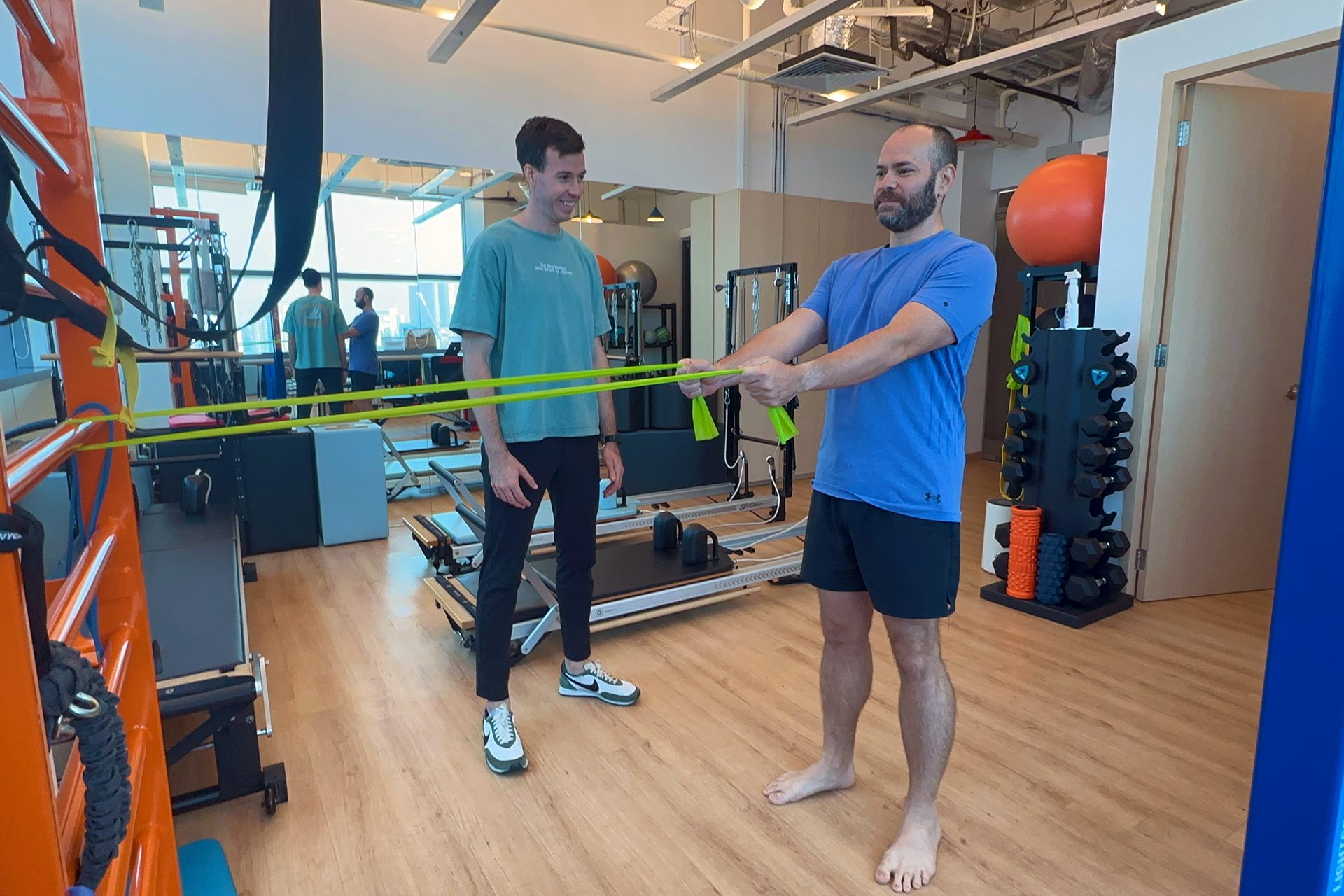What is Clinical Pilates?
Our expert physiotherapists and rehabilitation specialists utilize Clinical Pilates and mobility training to aid in injury recovery, enhance strength and flexibility, alleviate pain, and foster overall well-being. Tailored for individual rehabilitation needs, Clinical Pilates focuses on core strengthening and optimal movement post-injury or surgery, offering a patient-centric approach distinct from traditional Pilates.
This specialized practice, grounded in physiotherapy insights, targets core stability, balance, flexibility, and strength in a secure environment. Designed for various conditions, from back pain to chronic issues, it integrates physiotherapy with Pilates principles, ensuring exercises suit individual abilities and goals.
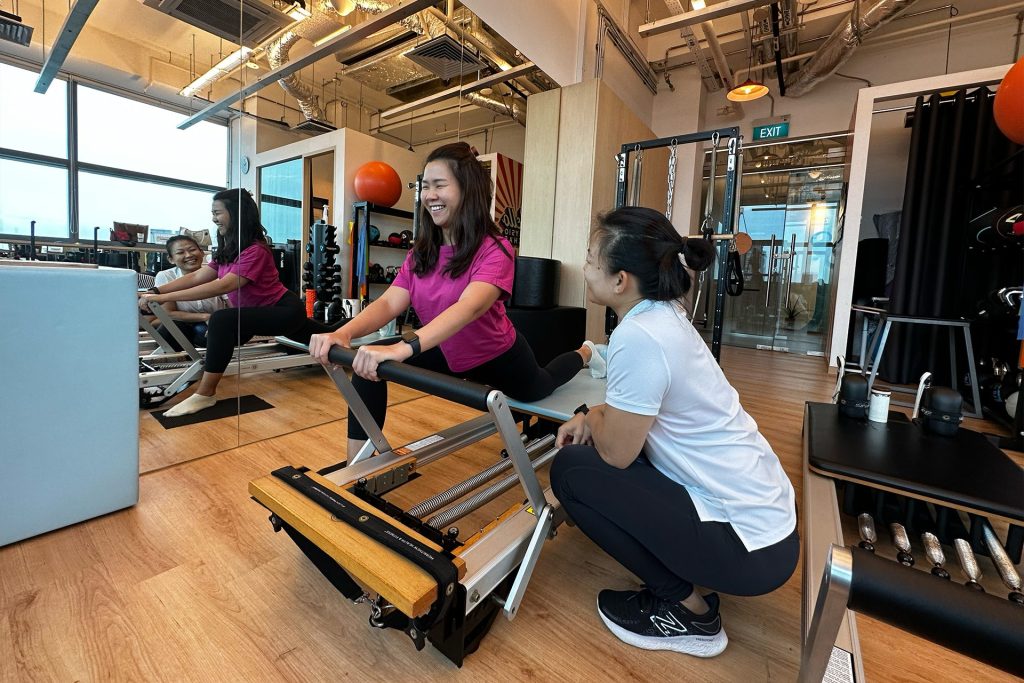
Clinical Pilates bridges rehabilitation and fitness, advancing healing and well-being. Customized programs based on your health history and goals promote improved mobility and life quality, focusing on mindful movement and breathing to aid recovery and prevent future injuries, demonstrating our commitment to evidence-based, comprehensive care.
Clinical Pilates for Specific Conditions
At our clinic, we understand that each individual’s health journey is unique, especially when managing specific conditions. Our Clinical Pilates in Singapore is meticulously designed to address diverse health concerns, offering a tailored approach to rehabilitation, pain management, and functional improvement.
Our experienced team is deeply committed to employing evidence-based practices to ensure effective treatment outcomes. Below, we explore how Clinical Pilates can serve as a transformative tool for various specific conditions.
Addressing Chronic Back and Neck Pain
Chronic back and neck pain significantly affects your life, restricting movement and activities. Our Clinical Pilates program, emphasizing core stability, strength, and flexibility, aims to reduce pain and avoid future injuries. With tailored exercises, we address the root causes of your discomfort, ensuring a balanced and aligned posture
Recover from Sports Injuries
Athletes face injury risks that can interrupt their sports participation. Our Clinical Pilates and physiotherapy program aids in sports injury rehab, boosts performance and prevents future issues. Concentrating on relevant muscle groups and movements enhances strength, flexibility, and balance, enabling a confident and resilient return to sports.
Improving Arthritis and Joint Pain
Arthritis and joint pain significantly impact comfort and mobility. Clinical Pilates offers a low-impact solution to ease pain and boost joint function. Our method focuses on gentle exercises, strengthening and stretching to alleviate joint stress and improve muscle support..
Addressing Women’s Pre and Post-Natal Care
Women experience distinct changes, especially during pregnancy and postpartum. Our Clinical Pilates provides targeted support for women’s health, including pre and post-natal care. Custom exercises enhance pelvic floor strength and core stability as well as to ease pregnancy-related discomforts. We foster a supportive environment, empowering women towards well-being and recovery.

Clinical Pilates FAQs
Who would benefit from Clinical Pilates?
Clinical Pilates builds strength imbalances in people recovering from injuries or post-surgery and those who suffer from musculoskeletal pain. Athletes can incorporate Clinical Pilates as part of their rehabilitation and build overall strength and proper body alignment to remain injury-free. The techniques are suitable to build strength in the shoulders, knees, hips, ankles, and post-op back surgery. The ultimate goal for clients is to address strength issues and to help them reach their active goals effectively and safely under the instruction of a trained Pilates specialist.
How is a Pilates reformer used during Clinical Pilates sessions?
A Pilates reformer is a piece of resistance equipment specifically designed for Pilates exercises. Sessions on the Pilates reformer can focus on a specific area or be used as part of full-body workouts. Throughout the session, you’ll work groups of muscles you don’t use very often, particularly your core muscles, which include your abs, lower back, and pelvis. The reformer enables clients to move through a full range of motion, which may involve pushing and pulling with the legs and arms against the springs, carriage, and one’s body weight to create a unique strength-building exercise that differs from traditional Pilates mat exercises. The reformer can target your different body parts while still concentrating on your core, giving you a more complete workout.
Does Clinical Pilates help with back pain?
Clinical Pilates can be a lifesaver for most people suffering from back pain. Clinical Pilates can help with back pain in a number of ways. It strengthens core muscles in the abdomen and pelvis, which can improve posture to help reduce pain. Clinical Pilates also helps rehabilitate injuries by focusing on the body’s optimal movement, whether caused by poor posture or acute injury. Clinical Pilates is beneficial because it targets specific problem areas for individual clients while benefiting the entire body.
Is Clinical Pilates as part of physiotherapy for knee pain effective as a treatment?
Clinical Pilates is a great form of strengthening for knee pain. Clinical Pilates exercises strengthen muscles around the knees that can relieve discomfort by providing support and stability to the joint, whether you have an overuse injury or have had knee surgery. Gradual improvements strengthen the muscles around the knees to support your body’s weight.
What is Prenatal Pilates?
Women with uncomplicated pregnancies can engage in Pilates strength and conditioning exercises throughout all stages of pregnancy. Regular physical activity during pregnancy, like through Prenatal Pilates, benefits women’s health to reduce related pain. Exercise plans can be created to strengthen and stretch specific muscle groups that are weak or tight from postural changes due to weight shifts and stresses that occur during pregnancy. Pilates is beneficial for women with abdominal wall separation, pelvic floor weakness and incontinence issues. It can be beneficial to improve the childbirth process, reducing complications for both mother and baby.
How can postnatal Pilates help after birth?
Childbirth is a demanding process in a woman’s body. Following birth, regaining abdominal and pelvic floor strength is essential to support the lower back. As Pilates focuses on movement patterns, these exercises can be instrumental in helping manage the demands of a newborn, such as ongoing lifting and bending and preventing stress. Postnatal Pilates focus on posture and flexibility and can be modified for women with cesarean sections, abdominal wall separation, or pelvic joint weakness from pregnancy. Postnatal Pilates works to help new mothers return to their daily activities without pain, stronger both physically and mentally, so that they can focus on bonding with their newborns rather than experiencing pain.
What is STOTT Pilates?
The Stott Pilates method focuses on the spine’s natural curve by rebalancing the muscles surrounding joints. It combines classic Pilates principles rooted in breath, concentration, and fluid range of motion. Still, it differs in the approach to postural alignment and varies in the sequence of exercises and equipment. The five main principles include proper breathing, neutral and imprinted positions versus a flat back, ribcage position, shoulder stability, and head and neck placement. An instructor will guide you through carefully choreographed routines to help you achieve your body awareness, balance, coordination, and endurance goals. Slow, muscle-toning movements will improve your health by increasing strength and flexibility. The numerous benefits include improved posture, increased circulation, back pain relief, improved muscle definition, reduced stress and anxiety, improved breathing habits, and increased energy.
Is Pilates good for runners?
Pilates is good for runners because it strengthens your core, which is important to reduce the risk of injuries during long-distance runs. It may feel natural to use leg strength only to increase the intensity of a workout, but core strength is important when powering through long distances at top speed. Pilates is an excellent exercise for runners because it strengthens many different muscles in the lower body, including the quads, hamstrings, glutes, and calves. Through a full range of motion movements and proper breathing during Pilates exercises, circulation is improved, tension is reduced, and focus is enhanced, which helps the mind and body power through a long run without as much fatigue. Clinical Pilates also gives you benefits like improved posture and better stability that are helpful while running.
Clinical Medical Pilates in Postoperative Rehabilitation
Our clinic prioritizes a methodical approach to surgery recovery, ensuring outcomes through Clinical Medical Pilates’ gentle rehabilitation. This method emphasizes controlled movements to enhance strength and flexibility, safeguarding against overstressing recovering tissues.
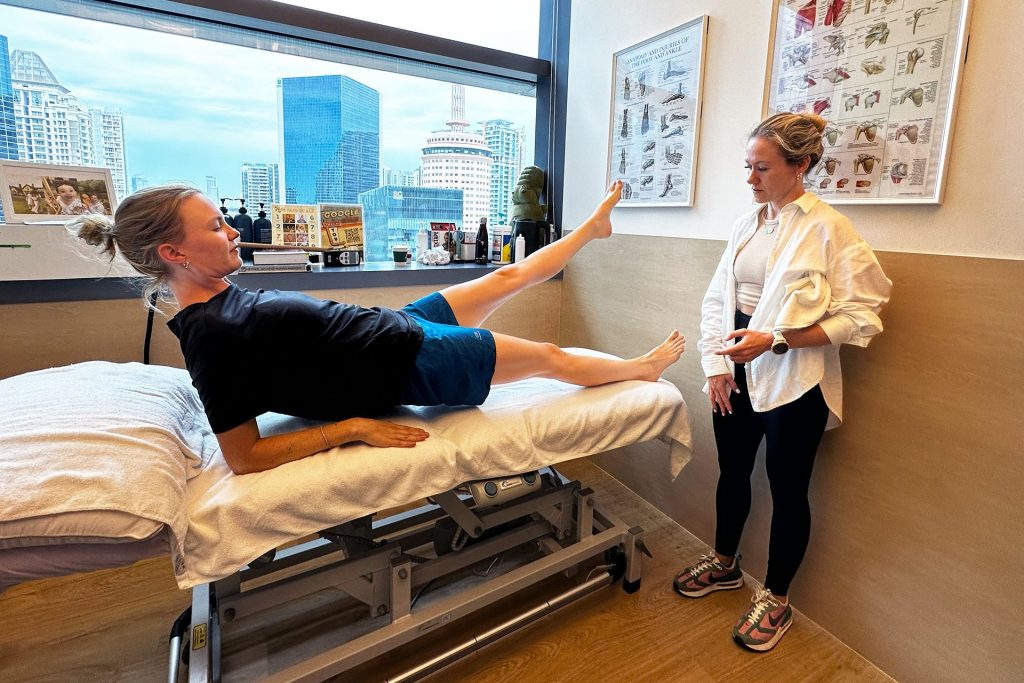
Pilates plays a crucial role in post-surgery recovery. For hip surgery, it targets the surrounding muscles for quicker recovery. In ACL knee surgery, recovery boosts strength and balance through focused work on the back, core, and hips. For spine surgery due to lower back issues, it strengthens the trunk and spine core muscles, easing disc pressure.
Working with orthopedic surgeons, our practitioners tailor a program to your recovery needs, focusing on early recovery stages for faster healing and a return to daily function. Our approach combines professional reassurance with clinical expertise to transform health outcomes, emphasizing our commitment to evidence-based, personalized care.
Physio Pilates to Increase Sports Performance
Using physio Pilates in Singapore can improve overall mobility and athletic performance. By connecting the mind and body, enhanced breathing techniques help to center and focus. Improving the range of motion mitigates injuries and reduces recovery time.
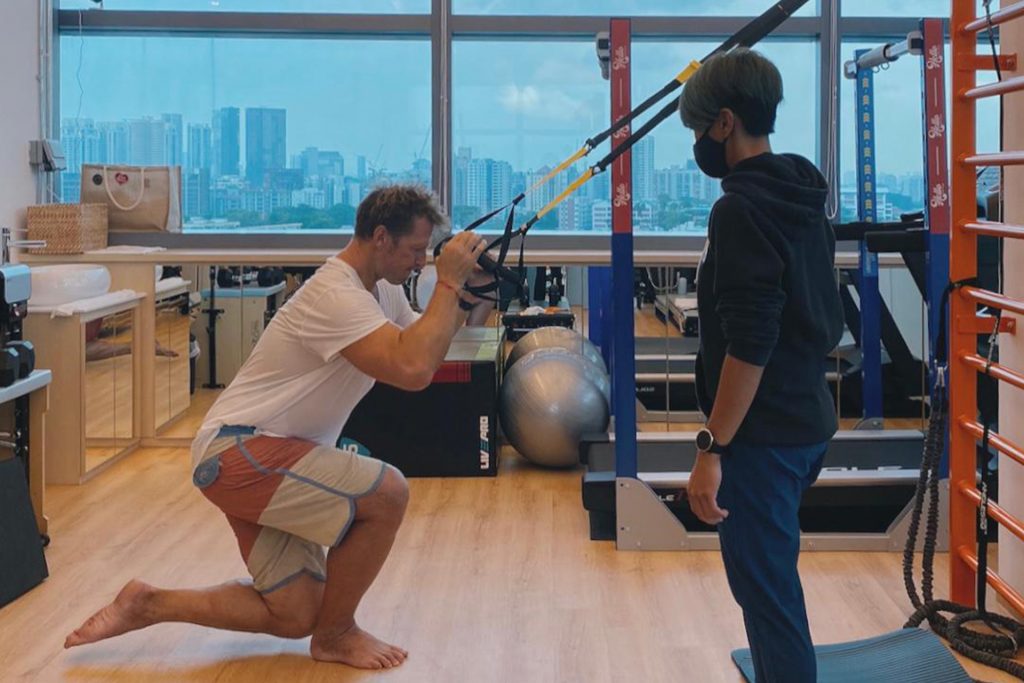
Strengthening stability through the core improves body alignment, which creates more fluid joint movements in the hips, trunk and knees and more efficient and controlled body movement to increase power.
What to Expect in a Clinical Pilates Session
HelloPhysio’s studio is committed to fostering recovery and instilling confidence in your health journey.
Wear comfortable and flexible clothing for your Clinical Pilates in Singapore session to ensure freedom of movement and instructor accuracy. After assessing your needs, your instructor will create a targeted Clinical Pilates plan focusing on pain relief, mobility, or performance. This program will harness body mechanics and rehabilitation expertise for effective results.
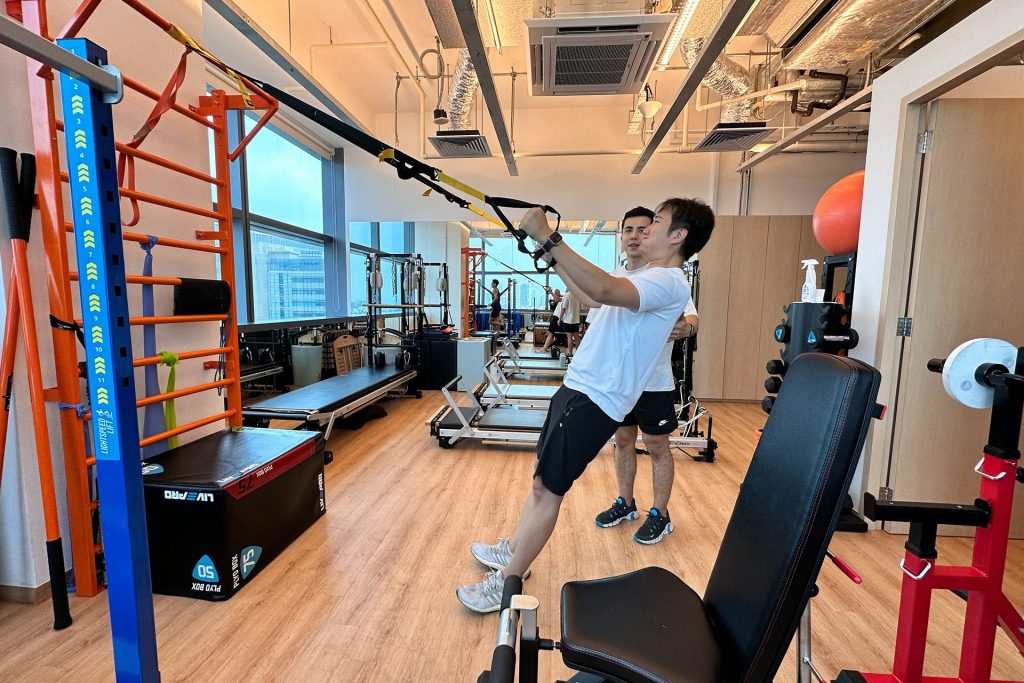
Each session is about 45 to 60 minutes long and includes a warm-up and tailored exercises under instructor guidance to enhance strength, flexibility, and balance.
We’ll customize session frequency—from once to multiple times weekly—based on program intensity and your goals, ensuring a fit with your lifestyle and progress toward health and wellness.
Start Your Journey to Recovery and Wellness
At our clinic, we are passionate about harnessing the power of Clinical Pilates to transform our clients’ health and well-being. Our commitment to a comprehensive, evidence-based approach ensures that every individual receives the care and support they need to overcome challenges and achieve optimal function.
Whether you’re seeking posture correction, core strengthening for back pain relief, or improved breathing for detoxification, our Clinical Pilates experts address various conditions, including scoliosis, chronic back pain, and post-mastectomy recovery.
Our approach targets pain or injury at its source, emphasizing extensions for muscle relaxation and healing, reducing re-injury chances. Clinical Pilates and physiotherapy can be individual sessions or part of an overall treatment plan.
Let HelloPhysio be your partner in health, guiding you toward a life of reduced pain, enhanced performance, and improved mobility. Contact us today to arrange a session with our team to discuss a targeted treatment plan.

